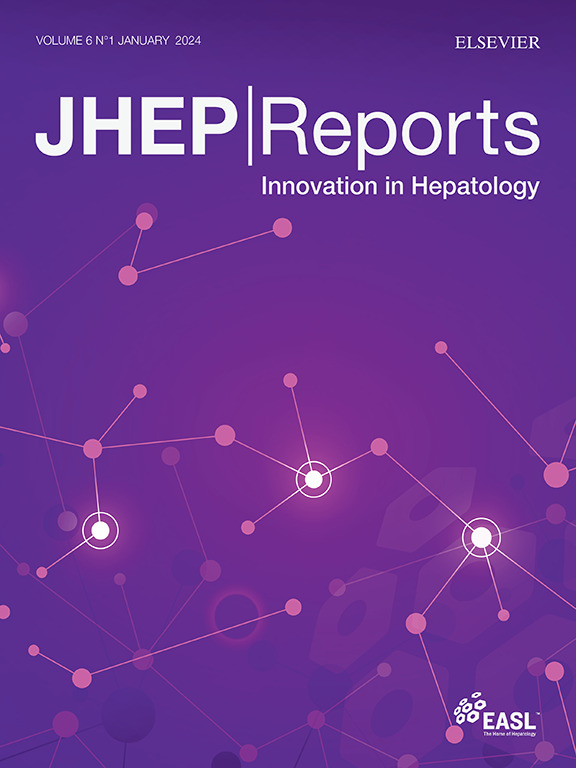血浆蛋白质组学分析用于疑似胆囊癌的精准医疗策略:一项初步研究
IF 9.5
1区 医学
Q1 GASTROENTEROLOGY & HEPATOLOGY
引用次数: 0
摘要
背景,目前,术前诊断方法不足以区分胆囊肿瘤和良性疾病,如果术前知道病理,可以避免多次手术切除。本研究旨在评估术前血浆蛋白是否可以区分胆囊癌(GBC)和胆囊炎,主要目的是在术前鉴定用于术后诊断的多变量描述的蛋白。方法回顾性、观察性、单中心研究纳入2009年至2020年在卡罗林斯卡大学医院行双节切除术和淋巴结切除术的82例疑似GBC患者。术前血浆样本使用来自SomaScan®的7500个蛋白质组学面板进行分析。采用包括机器学习正则化在内的高维统计方法对数据进行分析。结果在我们的研究中,我们鉴定并鉴定了一组651个在GBC和胆囊炎之间表现出差异表达的蛋白。通过多变量分析,我们证明了循环蛋白质组学数据为手术前诊断GBC提供了有价值的见解。值得注意的是,我们确定了8种血浆蛋白(PAHX、CD8A、HRG、CRIS2、Dynactin亚基2、AT2A3、CSTN2和DEPP)的一个亚群,该亚群可以有效地区分GBC和胆囊炎,在测试集上的诊断准确率为94%。这些发现具有临床验证的潜力,当怀疑GBC时,可以显著帮助术前决策。结论术前评估血浆蛋白可准确区分胆囊炎和恶性胆囊炎,支持无创检查的发展,当怀疑胆囊炎时可辅助术前决策。影响和意义本研究强调了血浆蛋白质组学分析在显著提高胆囊癌和胆囊炎术前诊断准确性方面的潜力。使用机器学习模型,我们确定了与胆囊癌诊断相关的生物学相关血浆蛋白。一种基于选定血浆蛋白的无创术前检查可能会增强临床决策,减少不必要的手术,并减轻疑似GBC患者的相关风险,这标志着精准医疗向前迈进了一步。本文章由计算机程序翻译,如有差异,请以英文原文为准。

Towards precision medicine strategies using plasma proteomic profiling for suspected gallbladder cancer: A pilot study
Background & Aims
Currently, preoperative diagnostic methods that can distinguish cancer from benign disease of the gallbladder are insufficient, and several surgical resections can be avoided if the pathology is known prior to surgery. This study aimed to assess whether preoperative plasma proteins can distinguish gallbladder cancer (GBC) from cholecystitis, with the main goal of identifying proteins for multivariate description of the postoperative diagnosis, before surgery.
Methods
Samples from 82 individuals with suspected GBC who underwent bisegmentectomy and lymphadenectomy at Karolinska University Hospital between 2009 and 2020 were included in this retrospective, observational, single-center study. Preoperative plasma samples were analyzed using a 7,500 proteomics panel from SomaScan®. High-dimensional statistical methods including machine learning regularization, were used to analyze the data.
Results
In our study, we identified and characterized a panel of 651 proteins that exhibited differential expression between GBC and cholecystitis. Through multivariate analysis, we demonstrated that circulating proteomics data provide valuable insights for diagnosing GBC before surgical intervention. Notably, we identified a subset of eight plasma proteins (PAHX, CD8A, HRG, CRIS2, Dynactin subunit 2, AT2A3, CSTN2, and DEPP) that effectively differentiated GBC from cholecystitis with a diagnostic accuracy of 94% when validated on a test set. These findings hold potential for clinical validation and could significantly aid in preoperative decision-making when GBC is suspected.
Conclusions
Our findings demonstrate that the preoperative assessment of plasma proteins can accurately differentiate cholecystitis from malignancy, supporting the potential development of a noninvasive test to assist preoperative decision-making when GBC is suspected.
Impact and implications
This study highlights the potential of plasma proteomic profiling to significantly improve the preoperative diagnostic accuracy of gallbladder cancer vs. cholecystitis. Using machine learning models, we identified biologically relevant plasma proteins associated with the diagnosis of gall bladder cancer. A noninvasive preoperative test based on selected plasma proteins could potentially enhance clinical decision-making, reduce unnecessary surgeries, and mitigate the associated risks for patients with suspected GBC, marking a step forward in precision medicine.
求助全文
通过发布文献求助,成功后即可免费获取论文全文。
去求助
来源期刊

JHEP Reports
GASTROENTEROLOGY & HEPATOLOGY-
CiteScore
12.40
自引率
2.40%
发文量
161
审稿时长
36 days
期刊介绍:
JHEP Reports is an open access journal that is affiliated with the European Association for the Study of the Liver (EASL). It serves as a companion journal to the highly respected Journal of Hepatology.
The primary objective of JHEP Reports is to publish original papers and reviews that contribute to the advancement of knowledge in the field of liver diseases. The journal covers a wide range of topics, including basic, translational, and clinical research. It also focuses on global issues in hepatology, with particular emphasis on areas such as clinical trials, novel diagnostics, precision medicine and therapeutics, cancer research, cellular and molecular studies, artificial intelligence, microbiome research, epidemiology, and cutting-edge technologies.
In summary, JHEP Reports is dedicated to promoting scientific discoveries and innovations in liver diseases through the publication of high-quality research papers and reviews covering various aspects of hepatology.
 求助内容:
求助内容: 应助结果提醒方式:
应助结果提醒方式:


